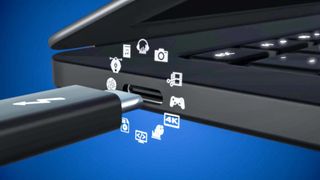RIP USB: These new cables thinner than a strand of hair are 10x faster
RIP USB: These new cables thinner than a strand of hair are 10x faster

USB, Thunderbolt and HDMI could see a massive bound in operation according to new research. Currently, researchers are studying the affects of information transmission using thin plastic polymer versus copper, and the findings are incredible.
Every bit presented at the Feb IEEE International Solid-State Circuits Conference and reported by MIT, new research by Raytheon, Intel, the Naval Research Laboratory and the Role of Naval Enquiry suggests that polymer cables as thin every bit a strand of hair can transmit data ten times faster than USB.
- USB 4: everything you lot demand to know
- These are the all-time cheap HDMI switchers to buy right now
- Plus: iPad Pro 2021 with mini-LED brandish release date just leaked
At the moment, copper is the fabric of selection for transferring data within cables. But copper has its downsides. It requires a lot of power when transmitting high amounts of data.
"There's a fundamental tradeoff between the amount of free energy burned and the rate of information exchanged," said Raytheon's Jack Holloway, lead author on the enquiry.
Every bit data transfers keep to grow more than dense, adding bulkier copper is becoming plush.
The researchers have instead opted for plastic polymer. It's lighter and potentially cheaper than copper, and more energy efficient when transmitting high amounts of information. It rivals the speed of fiber-optic, merely is "compatible directly with silicon chips, without whatsoever special manufacturing," said Holloway.
At the moment, total bandwidth for this plastic polymer cablevision is 105 Gbps. By comparing, USB 3.1 SuperSpeed tops out at ten Gbps
Just why make a new material when cobweb-optics already exists? While fiber-optic, which uses photons, is cracking for transmitting information speedily with little free energy, it doesn't play as well with silicon computer chips.
"There'southward currently no way to efficiently generate, dilate, or observe photons in silicon," says Holloway. "At that place are all kinds of expensive and complex integration schemes, but from an economics perspective, it's not a bang-up solution."
What's fascinating about this research is how thin Holloway and his team were able to make these plastic polymer cables. At 0.4 millimeters thick, it's nigh the size of a human hair. Considering the HDMI two.0 cables that serpent behind your television are already bulky, this new technology could brand cable management an absolute breeze.
And while 105 Gbps is blazing fast, researchers believe it can become faster by bundling plastic polymer cables together.
"Then the data charge per unit volition be off the charts," said Ruonan Han, associate professor at MIT'southward Department of Electric Technology and Computer Science (EECS). "Information technology could be i terabit per 2nd, nonetheless at low cost."
At that place's no estimated time on when this engineering science would go widely bachelor. Merely before it does, it will likely first exit to enterprise first earlier trickling out to the masses.
- More: The best USB drives in 2021
Source: https://www.tomsguide.com/news/rip-usb-these-new-cables-thinner-than-a-strand-of-hair-are-10x-faster
Posted by: stephensuppon1939.blogspot.com


0 Response to "RIP USB: These new cables thinner than a strand of hair are 10x faster"
Post a Comment